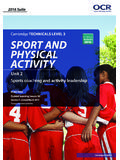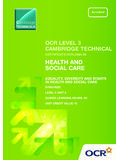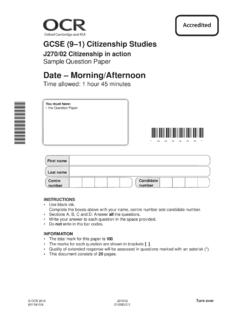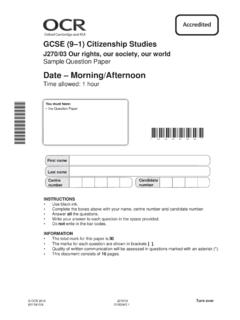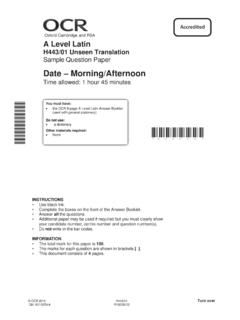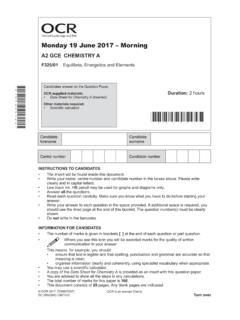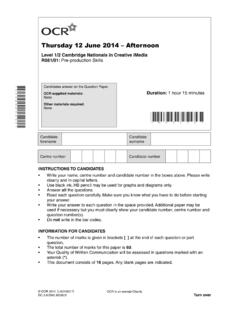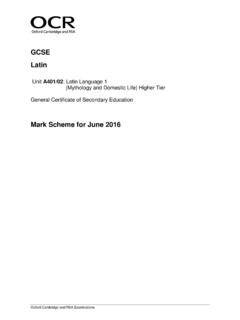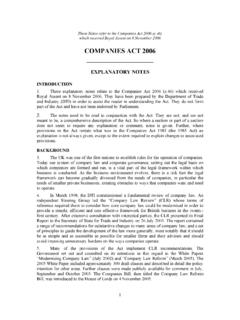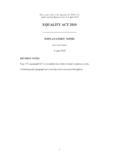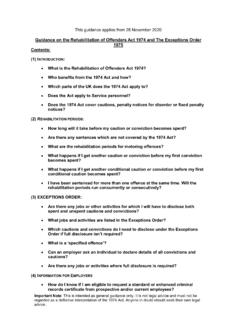Transcription of CERTIFICATE/DIPLOMA IN HEALTH AND SOCIAL CARE
1 INDIVIDUAL RIGHTS IN HEALTH AND SOCIAL CAREK/600/6873 LEVEL 2 UNIT 2 GUIDED LEARNING HOURS: 30 UNIT CREDIT VALUE: 5 OCR LEVEL 2 CAMBRIDGE TECHNICALCERTIFICATE/DIPLOMA INHEALTH AND SOCIAL RIGHTS IN HEALTH AND SOCIAL CAREK/600/6873 LEVEL 2 UNIT 2 AIM OF THE UNITAll individuals have the right to be treated equally and fairly. It is the duty of the HEALTH and SOCIAL Care provider to support these rights and uphold and maintain anti-discriminatory practice. The aim of this unit is to provide learners with knowledge and understanding of the diverse backgrounds and needs of people who use services, the legal responsibilities to support individuals rights and the underlying principles that inform effective practice.
2 The unit will also give learners a background in the legal and regulatory framework within which HEALTH and SOCIAL care services are OF THE UNIT We live in a diverse, multi-cultural society. We are all different and do not necessarily hold the same views or unit will help learners to appreciate the impact that diversity can have on the way HEALTH and SOCIAL Care services are provided. It is essential that learners understand the rights that all individuals have and the principles that support these rights, so that care can be delivered effectively.
3 The unit will also introduce leaners to regulations and laws that impact on care unit will provide learners with knowledge of the ethical responsibilities of care providers. 3 Individual Rights in HEALTH and SOCIAL Care Level 2 Unit 21 Know factors that contribute to a diverse and equal society 2 Understand principles and values which underpin the support given to individualsP1 Identify factors that contribute to the equality of individuals in society P2 Explain the individual rights of people who use servicesP3 Explain the principles and values which underpin the support for people who use servicesM1 describe the problems associated with stereotyping.
4 Labelling and prejudiceD1 assess the impact of applying principles and values when supporting people who use servicesASSESSMENT AND GRADING CRITERIAL earning Outcome (LO) Pass Merit Distinction The assessment criteria are To achieve a merit the To achieve a distinction the pass requirements for evidence must show that, the evidence must show this unit. in addition to the pass that, in addition to the pass criteria, the learner is able to: and merit criteria, the The learner will: The learner can: learner is able to.
5 CONTENTThe unit content describes what has to be taught to ensure that learners are able to access the highest which follows an details what must be taught as part of that area of which follows an is illustrative, it should be noted that where is used, learners must know and be able to apply relevant examples to their work though these do not need to be the same ones specified in the unit Outcome 1 Know the factors that contribute to a diverse and equal society SOCIAL factors: diversity ( culture, ethnicity, faith, gender, sexuality, age, family structure, SOCIAL class and geographical position) Political factors: the role and impact of current legislation, regulations, policies and codes of practice on the delivery of HEALTH and SOCIAL care services ( Legal and regulatory frameworks.)
6 The Equality Act 2010, The Children Act 2004, Every Child Matters, Disability Discrimination Act 2005, Care Standards Act 2005, Data Protection Act 1998, Freedom of Information Act 2005 Policies: ( Equal Opportunities, Bullying, Confidentiality, HEALTH and Safety) Codes of practice: ( General SOCIAL Care Council/Care Council for Wales/Northern Ireland SOCIAL Care Council codes of practice and rules of conduct for SOCIAL care workers and employers; charters, for example entitlement to services) Biological factors: ( physical features; disabilities learning, physical) Equality: ( anti-discriminatory practice; discriminatory practice stereotyping, labelling, prejudice) Individual rights ( right to be respected, treated with equality, and fairly, respected as an individual and not discriminated against, privacy, dignity, protection from danger and harm; right to access information relevant to themselves.)
7 Right to communicate using their preferred methods of communication and language; right to be cared for in a manner that takes account of their needs, choices, preferences).Learning Outcome 2 Understand the principles and values which underpin the support given to individuals Values of care, HEALTH and SOCIAL care settings: ( promoting equality and diversity of people who use services; promoting individual rights and beliefs; maintaining confidentiality) Values of care, early years settings ( making the welfare of the child paramount; keeping children safe and maintaining a healthy environment; working in partnership with parents/families.
8 Supporting children s learning and development; valuing diversity; equality of opportunity and anti-discriminatory practice; maintaining confidentiality; working with others; reflective practitioners) Impact of principles and values: (eg. person-centred approach to care and provision, individual needs met, rights upheld, privacy, safety, empowerment, independence; legislation/policies etc provide a system of redress, clear guidelines for practitioners to follow, raises standards of care, gives consistency of care)5 Individual Rights in HEALTH and SOCIAL Care Level 2 Unit 2 DELIVERY GUIDANCEThis unit is concerned with the issues of diversity, equality and rights in HEALTH and SOCIAL Care.
9 The unit also covers the duty of the care provider in upholding individuals rights and maintaining anti-discriminatory Know factors that contribute to a diverse and equal societ suggested starting point in delivery of this unit is to get learners to establish how our society is structured and how individuals in society may differ. Case studies and scenarios can be used to illustrate different SOCIAL and cultural backgrounds. The impact of stereotyping, labelling and prejudice on individuals could also be discussed through the use of case studies.
10 This approach is useful in generating discussion and giving learners the opportunity to share their own experiences and attitudes to diversity. Learners should be encouraged to challenge their own assumptions regarding the differences between people. Once learners are able to identify the factors that contribute to diversity, then political factors which address inequality may be introduced. Learners can research the role of current legislation and policy with regard to inequality. Documentaries and news items which consider the role of legislation, regulations and policy can be useful to stimulate Understand principles and values which underpin the support given to individuals.

